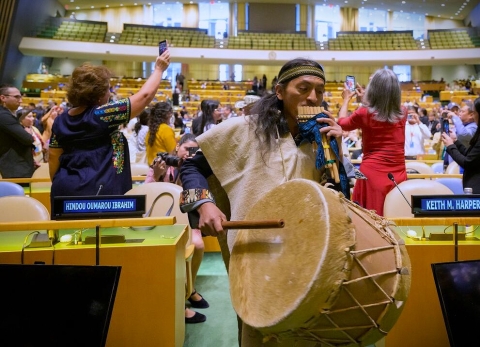
Maryknoll missioners joined Indigenous people at the UN calling for greater attention to their self-determination, needs of Indigenous youth, and financing opportunities.
The following article was published in the July-August 2024 issue of NewsNotes.
Indigenous peoples from around the world raised the urgent need to protect their human rights at the 23rd Session of the United Nations Permanent Forum on Indigenous Issues (UNPFII) in New York in April. In the words of the Maryknoll Sisters’ observer to the UN, Sister Margaret Lacson, “among all the conferences I’ve attended at the UN so far, this was the most colorful and most attended. Never have I seen Conference Room 4 full and overflowing and colorful with the varied expressions of Indigenous dresses.”
This session, themed “Enhancing Indigenous Peoples’ right to self-determination in the context of the United Nations Declaration on the Rights of Indigenous Peoples,” showcased a diverse array of Indigenous cultures and drew significant international attention and participation.
The session commenced with the election of Hindou Ibrahim, a 40-year-old Indigenous rights activist from Chad, as the Chair of the Permanent Forum. Ibrahim’s election was celebrated in a ceremony where Indigenous women placed scarves on Ibrahim, symbolizing acceptance and unity.
The conference concluded with a full, 25-page report. Sister Margaret Lacson, MM, shared some key takeaways:
- Self-Determination and Autonomy: Central to the discussions was the right to self-determination and autonomy for Indigenous Peoples. It recommended that member states review and revise their constitutions and legal frameworks to fully recognize the rights of Indigenous Peoples, including the right to self-determination.
- Youth Engagement: The forum highlighted the urgent need to address the high rates of suicide among Indigenous youth and urged the UN to facilitate their engagement in decision-making processes across all UN platforms. This call to action aims to empower Indigenous youth and ensure their voices are heard in shaping policies that affect their futures.
- Financial Support: Sustainable financing for initiatives supporting Indigenous women and youth was a critical topic. The forum recommended that international financial institutions, like the World Bank, create strategic opportunities to amplify Indigenous Peoples’ priorities and concerns.
- Indigenous Women: Recognizing the pivotal role of Indigenous women in transmitting cultural values and traditions, the forum called for their full and effective participation in decision-making at both national and international levels. The widespread discrimination and violence faced by Indigenous women were also addressed, with calls for stronger protections and support systems.
The report also considered some of the most pressing obstacles faced by Indigenous peoples:
- Protection of Indigenous Lands: The forum expressed grave concerns about the dispossession and destruction of Indigenous lands due to extractive industries and green energy projects. It called for high-integrity projects that ensure accountability for environmental impacts and provide measurable benefits to Indigenous communities. The plight of the Maasai people in Tanzania was specifically highlighted, with a call for the cessation of their forced evictions from the Ngorongoro Conservation Area.
- Human Rights Violations: The alarming increase in the criminalization, attacks, and arbitrary detention of Indigenous leaders and human rights defenders was another critical issue. The forum demanded immediate action to protect these individuals and ensure their safety as they continue to advocate for their communities.
- Peacebuilding: The forum emphasized the role of Indigenous peoples as peacebuilders and urged member states to focus on achieving peace by utilizing Indigenous knowledge and practices.
Another Maryknoll contribution to the conference was the coordination of a visit to the forum by a delegation from the Amazon, convened by the Pan-Amazonian Ecclesial Network (REPAM). Maryknoll Fathers and Brothers, Sisters, and Lay Missioners all have a presence in countries connected to the Amazon rainforest, giving the Maryknoll Office for Global Concerns a strong solidarity with REPAM. At the UN Forum, the delegation shared harrowing stories of land usurpation by mining and logging industries and industrial agriculture. The Special Rapporteur on the Rights of Indigenous Peoples, Francisco Cali Tzay, committed to visiting these communities in Brazil to document their experiences and advocate for their rights at an international level.
The 23rd session of the UNPFII highlighted the urgent need for international cooperation and support to protect Indigenous rights, cultures, and lands. The forum’s recommendations, if implemented, could significantly enhance the self-determination and autonomy of Indigenous communities worldwide.
Photo of the opening of the 23rd Session of Permanent Forum on Indigenous Issues, 15 April 2024, by Manuel Elías courtesy of the UN.
